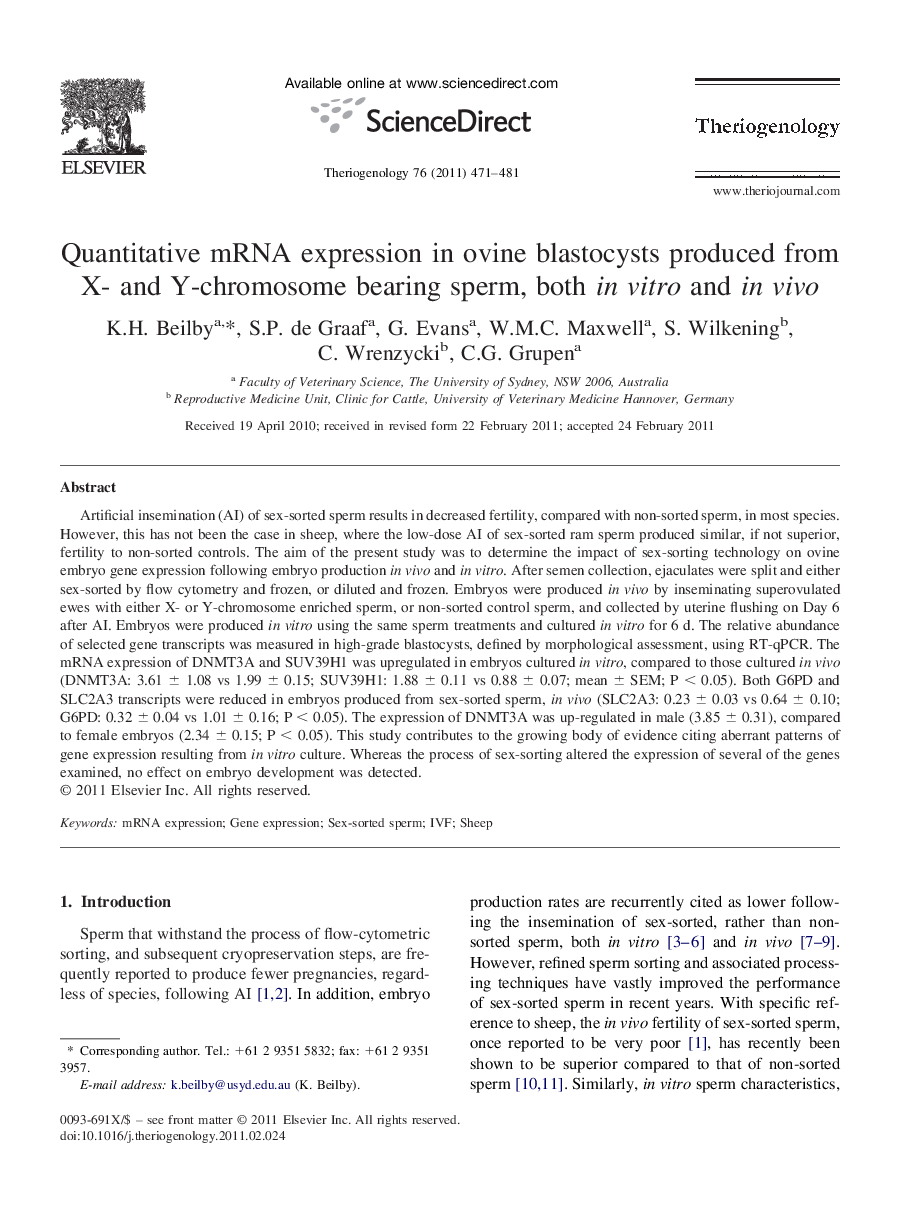| کد مقاله | کد نشریه | سال انتشار | مقاله انگلیسی | نسخه تمام متن |
|---|---|---|---|---|
| 10892697 | 1082114 | 2011 | 11 صفحه PDF | دانلود رایگان |
عنوان انگلیسی مقاله ISI
Quantitative mRNA expression in ovine blastocysts produced from X- and Y-chromosome bearing sperm, both in vitro and in vivo
دانلود مقاله + سفارش ترجمه
دانلود مقاله ISI انگلیسی
رایگان برای ایرانیان
کلمات کلیدی
موضوعات مرتبط
علوم زیستی و بیوفناوری
علوم کشاورزی و بیولوژیک
علوم دامی و جانورشناسی
پیش نمایش صفحه اول مقاله

چکیده انگلیسی
Artificial insemination (AI) of sex-sorted sperm results in decreased fertility, compared with non-sorted sperm, in most species. However, this has not been the case in sheep, where the low-dose AI of sex-sorted ram sperm produced similar, if not superior, fertility to non-sorted controls. The aim of the present study was to determine the impact of sex-sorting technology on ovine embryo gene expression following embryo production in vivo and in vitro. After semen collection, ejaculates were split and either sex-sorted by flow cytometry and frozen, or diluted and frozen. Embryos were produced in vivo by inseminating superovulated ewes with either X- or Y-chromosome enriched sperm, or non-sorted control sperm, and collected by uterine flushing on Day 6 after AI. Embryos were produced in vitro using the same sperm treatments and cultured in vitro for 6 d. The relative abundance of selected gene transcripts was measured in high-grade blastocysts, defined by morphological assessment, using RT-qPCR. The mRNA expression of DNMT3A and SUV39H1 was upregulated in embryos cultured in vitro, compared to those cultured in vivo (DNMT3A: 3.61 ± 1.08 vs 1.99 ± 0.15; SUV39H1: 1.88 ± 0.11 vs 0.88 ± 0.07; mean ± SEM; P < 0.05). Both G6PD and SLC2A3 transcripts were reduced in embryos produced from sex-sorted sperm, in vivo (SLC2A3: 0.23 ± 0.03 vs 0.64 ± 0.10; G6PD: 0.32 ± 0.04 vs 1.01 ± 0.16; P < 0.05). The expression of DNMT3A was up-regulated in male (3.85 ± 0.31), compared to female embryos (2.34 ± 0.15; P < 0.05). This study contributes to the growing body of evidence citing aberrant patterns of gene expression resulting from in vitro culture. Whereas the process of sex-sorting altered the expression of several of the genes examined, no effect on embryo development was detected.
ناشر
Database: Elsevier - ScienceDirect (ساینس دایرکت)
Journal: Theriogenology - Volume 76, Issue 3, August 2011, Pages 471-481
Journal: Theriogenology - Volume 76, Issue 3, August 2011, Pages 471-481
نویسندگان
K.H. Beilby, S.P. de Graaf, G. Evans, W.M.C. Maxwell, S. Wilkening, C. Wrenzycki, C.G. Grupen,